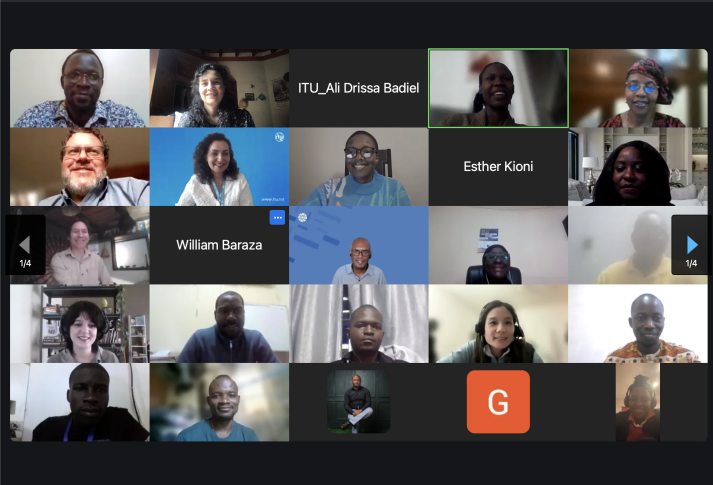
On 18 June 2025, institutional partners, grassroots leaders and connectivity advocates from across the continent gathered virtually to launch the Blended Training Programme for ICT Network Managers in Indigenous and Rural Communities – Africa edition (2025-2026). Led by the International Telecommunication Union (ITU), the Association for Progressive Communications (APC), Rhizomatica and the African Advanced Level Telecommunications Institute (AFRALTI), the programme aims to strengthen the capacity of rural communities to develop and manage their own connectivity solutions.
Designed specifically for rural and remote contexts, the training programme offers a comprehensive blend of technical, regulatory and organisational learning. The approach builds on the experiences of a similar initiative developed in Latin America and is grounded in participatory methodologies and community knowledge.
More than 450 applications were received and 99 participants were selected from over 15 countries, including Kenya, Uganda, Ethiopia, Ghana, Nigeria, South Africa, Zambia, Cameroon and the Democratic Republic of Congo. The group is diverse in age (with 56 people under 35 and 43 over 35) and 27% are women.
Opening session
The opening session featured welcoming remarks from programme coordinators Risper Arose and Carlos Baca, who emphasised the importance of locally led approaches to connectivity and the role of collective learning in fostering long-term digital inclusion. They were joined by a panel of institutional speakers who shared reflections on the significance of the initiative and its contribution to reshaping the digital inclusion landscape in Africa.
Speakers underscored the importance of enabling policy environments, community-owned infrastructure and capacity building to address the structural inequalities that persist in rural and Indigenous areas. They called for collaborative, inclusive strategies that elevate the leadership of those most affected by digital exclusion.
Ali Drissa Badiel, area representative for West Africa at ITU, highlighted the programme’s strategic relevance: “This programme aligns with the African Union's digital transformation agenda and ITU’s priority to strengthen local capacity. Supporting Indigenous and rural communities to manage their own networks is not only strategic – it is essential for sustainable and inclusive connectivity across the continent.”
Echoing this vision, Josephine Miliza, regional policy coordinator for Africa at the Local Networks Initiative, emphasised the programme’s community-centred design:
“This initiative recognises that people in rural and underserved areas are not just beneficiaries – they are the architects of their own digital futures.”
From ITU’s global inclusion efforts, Roxana Widmer-Iliescu, senior digital inclusion coordinator, underscored the value of collaboration: “This programme reflects our shared commitment to ensure that no one is left behind. Investing in local skills and collective leadership is key to bridging persistent digital divides.”
Sylvie Siyam, board member of APC and president of PROTEGE QV, highlighted the programme’s structural impact: “Community-centred technical and organisational training is essential to ensure meaningful local connectivity. Initiatives like this not only promote access, but also generate employment, strengthen local capacities, and support long-term economic transformation.”
Peter Bloom, director of Rhizomatica, added: “What makes this programme different is that it doesn’t assume solutions – it listens first. It’s about building the technical and organisational foundations that communities themselves define and lead.”
Institutional support from regional and global organisations was also noted. William Baraza, director of AFRALTI, stated: “AFRALTI is proud to back this initiative, which blends technical knowledge with social impact. Empowering community-based talent is vital for long-term change.”
Esther Kioni, senior director of training and learning at the Internet Society (ISOC) Foundation, highlighted the programme’s emphasis on accessibility: “When learning opportunities are grounded in context and accessibility, they build not only capacity, but confidence. This programme is a model for how training should be designed.”
From a broader policy and ecosystem perspective, Dawit Bekele, regional vice president for Africa at ISOC, added: “Bridging the digital divide requires the joint effort of institutions, communities and networks. This programme is proof that such collaboration is not only possible – it is powerful.”
Training programme
The training programme includes five online courses running from June to December 2025, covering the development of ICT projects in community contexts, telecommunications and community networks, the basics of electricity and solar energy, telecommunications policies and regulatory frameworks and economic sustainability and organisational management. These will be followed by an in-person bootcamp scheduled for the first half of 2026, tentatively planned for Nairobi, Kenya, where participants will engage in hands-on activities, apply their learning in practice and collaborate on the development of community-driven connectivity initiatives.
Courses will begin on 23 June 2025 and are hosted on a dedicated online platform designed for use in low-bandwidth environments and supporting both mobile and desktop access with offline capabilities. Each course will feature guest experts who will share insights and experiences to deepen the learning journey and inspire new approaches.
This programme is the result of years of collaboration between global and regional partners, facilitators and community leaders who have worked side by side to co-create a meaningful and inclusive process. It is a testament to what can be achieved when knowledge is shared openly, leadership is collective and communities are at the centre of change.